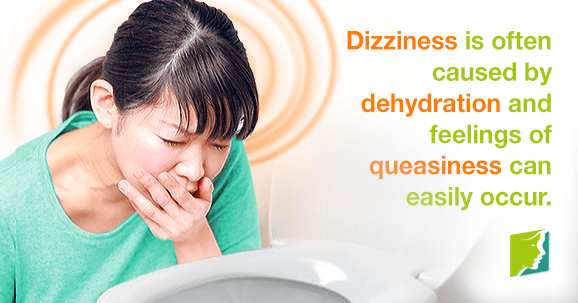There is a lot more to dizziness than just slight feelings of discomfort - sufferers of this condition are well aware of the other symptoms. Understanding what can happen during dizziness episodes is important for personal peace of mind, which may in turn reduce their recurrence by itself. Read on to learn about six dizziness symptoms so that you know what to expect.
Nausea
Dizziness as a condition is often caused by dehydration, which is especially prevalent in women going through menopause, as the body has to work harder to maintain the natural rate of its functions. Dizziness symptoms, in turn, are often similar to those of dehydration, and feelings of queasiness and nausea can easily occur.
Fatigue
Part of a vicious circle of dizziness symptoms, fatigue can also cause dizziness. Excess stress in daily life is often known to induce the symptom, and nutritional deficiencies that contribute to dizzy spells leave the body feeling tired and run-down.
Lightheadedness
Some women report a lightheaded sensation, as though the head were disconnected from the body. This is especially common in conjunction with drinking too much caffeine, a stimulant that can cause highs and lows. Low blood pressure caused by hormonal imbalance can also mean that not enough blood flows to the brain, creating this feeling.
Changes in Appetite
People experiencing dizziness symptoms may lose their appetite, even if just for a short while. This often occurs if nausea is also present. On the other hand, others may find themselves eating excess amounts of sugar in an attempt to balance blood sugar levels. This can cause several dietary repercussions.
Headaches
Dizziness may occur as a result of terrible headaches. Symptoms include double vision, loss of balance, slurred speech, and a ringing in the ears. Some specialists suggest that headaches and dizziness could also be symptoms of possible type of migraine.
Ringing in the Ears
Tinnitus, often called "ringing in the ears," is another symptom of dizziness. The noises you hear can be soft or loud. Almost everyone notices a mild form of tinnitus once in a while that only lasts a few minutes; however, constant or recurring tinnitus is stressful and makes it harder to focus.
Once dizziness symptoms are understood in their entirety, each episode becomes less disconcerting, and peace of mind can make it easier to find effective treatments. A balanced diet, regular exercise, and a healthier overall lifestyle can help keep dizziness away from your days.
Sources
- 34-Menopause-Symptoms.com. (2013). Common Causes of Dizziness in Menopausal Women. Retrieved September 18, 2013 from https://www.34-menopause-symptoms.com/dizziness/articles/common-causes-of-dizziness-in-menopausal-women.htm
- 34-Menopause-Symptoms.com. (2013). Dizziness Symptom Information. Retrieved September 18, 2013 from https://www.34-menopause-symptoms.com/
- dizziness.htm



